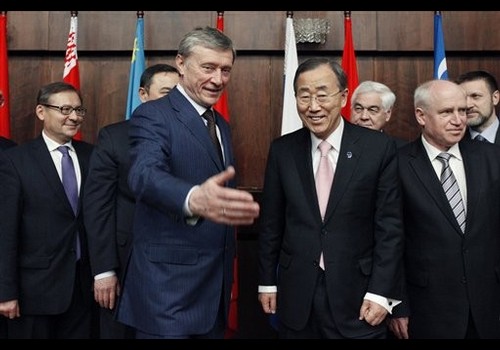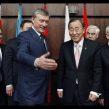
The CSTO Seeks Stronger Security Arrangements
Publication: Eurasia Daily Monitor Volume: 8 Issue: 98
By:

The Russian-led security alliance, the Collective Security Treaty Organization (CSTO), which includes Armenia, Belarus, Kazakhstan, Kyrgyzstan, Russia, Tajikistan and Uzbekistan, has pledged to face security challenges in Central Asia by boosting military cooperation.
Russian military officials urged the grouping to boost their defense ties. The unified defense policies of the CSTO member states would stabilize the situation in Central Asia, argued Sergei Chekinov, head of the Center of Military and Strategic Studies of the General Staff of the Russian Armed Forces. The region may be destabilized due to a combination of internal and external factors or foreign meddling, he told a round table in Moscow. Western powers aim to hinder the development of the CSTO as a regional security organization, hence member states should expand military cooperation and foreign policy coordination, Chekinov argued (Interfax, May 5).
The CSTO’s ambitions appeared not to be limited to Central Asia. On April 13, the CSTO Secretary-General, Nikolai Bordyuzha, said the CSTO could have contributed to peace-making efforts in Libya. He also urged to stop violence and refrain from any further use of military force there (Interfax, April 13). Furthermore, the CSTO indicated plans to expand the grouping. On May 5, Russian news agencies cited CSTO sources as arguing that Serbia could join the grouping. According to these sources, the matter may be discussed in June (Interfax, May 5).
Last month, the grouping announced the launch of a new joint force. On April 27, the CSTO said it completed the formation of the Collective Peacekeeping Forces (KMS). All member states formed the international peacekeeping force and the KMS totals 4,200 personnel, Bordyuzha announced in Moscow. The collective peacekeeping force took a long time to materialize. In January 2011, Bordyuzha said that the KMS was supposed to have been formed in late 2010. Apart from the peacekeeping efforts, the CSTO pledged to counter security challenges originating from other regions. On April 27, Bordyuzha voiced concern over what he described as possible penetration of the “controlled chaos” from the Middle East, instigated by the “transnational political and financial structures” (Interfax, April 27).
The CSTO also promised to counter uncontrolled movements of people. On March 4, the CSTO indicated plans to draft a joint list of blacklisted individuals not allowed to enter member states. On February 25, Bordyuzha said the CSTO would increase efforts to counter illegal migration. He also warned the member states to be prepared to face increased illegal immigration following the crises in North Africa.
The grouping also backed up its security pronouncements via regular military drills. On April 27, Bordyuzha announced the Rapid Reaction Force (KSOR) is due to hold maneuvers in Armenia, Kazakhstan, Kyrgyzstan, Russia and Tajikistan this year. The KSOR currently includes some 19,000 personnel. He also said the CSTO joint military command was drafting contingency plans for actual military deployment in crisis situations.
Despite its recent volatility, Kyrgyzstan also opted to host the CSTO drill. On April 23, the country’s defense ministry announced the Collective Rapid Deployment Forces (KSBR) are due to hold maneuvers in Kyrgyzstan on July 5-8, 2011, in Alamudun district of the Chuiskaya region.
The CSTO has also moved toward closer coordination of military planning. On April 14, chiefs of the General Staff of the CSTO member states agreed to form a military committee to supplement the Council of Defense Ministers. The new committee would aim to further develop the military component of the organization. Late last year, CSTO leaders concluded new deals and reviewed some of the grouping’s treaties, seeking more efficient ways to counter threats and safeguard the security of member states. The heads of states of the CSTO gathered in Moscow on December 10, 2010. The summit meeting adopted a total of 33 agreements and decisions, including amendments of the CSTO founding treaties and five agreements on crisis settlement.
Last December, Belarus assumed the rotating presidency of the CSTO. Since June 2009, Minsk has been refusing to assume the grouping’s presidency and refrained from the KSOR deal amid economic disagreements with Moscow. Subsequently, Russia was forced to assume the CSTO “temporary presidency.” But late last year, disagreements between Russia and Belarus have been largely resolved.
As before, the grouping appeared keen to claim a measure of a global role. The CSTO member states have long pledged to support UN-led international peacekeeping efforts. On April 22, Bordyuzha indicated plans to work out and sign a cooperation roadmap between the CSTO and the UN. The statement followed a meeting with visiting UN Secretary General Ban Ki-moon.
The CSTO has long claimed a more prominent international role, including involvement in international peacekeeping operations. Since late 2006, CSTO officials have indicated willingness to participate in UN peacekeeping operations. On March 18, 2010, Bordyuzha and Ban Ki-moon signed the joint declaration and pledged to cooperate in countering international terrorism and to jointly act to settle conflicts. CSTO officials have criticized NATO’s failure to treat the organization as an equal partner, but still sought better ties with the Western alliance. On February 21, Bordyuzha conceded there were no prospects of cooperation between the CSTO and NATO. The lack of official contacts with NATO causes no sufferings, he said, adding that both blocs could have cooperated in combat against illegal drugs.
However, some dissenting voices remain inside the CSTO. Uzbek President Islam Karimov told the summit meeting in December 2010 that the CSTO must focus on countering external threats, and not to be involved in settling conflicts among former Soviet states. He argued that a CSTO intervention to quell violence inside member states should be excluded. On May 5, Karimov told his visiting Turkmen counterpart, Gurbanguly Berdimuhamedov, that both nations had similar views on regional security. As Turkmenistan has long advocated its “neutrality,” Karimov’s statement may indicate a drift towards “neutralism,” a possible deviation from the CSTO stated goal of unified defense and foreign policies.
During the summit meeting in Moscow in December 2010, Uzbekistan refrained from signing some of the deals. Uzbekistan has long insisted that CSTO forces should be deployed only by a consensus decision, and urged that these forces not be used to settle conflicts between CSTO member states. Therefore, the CSTO continued to seek greater international clout as a pro-active regional grouping. However, past disagreements between CSTO member states came to indicate the grouping’s limited capabilities of effective joint actions.




